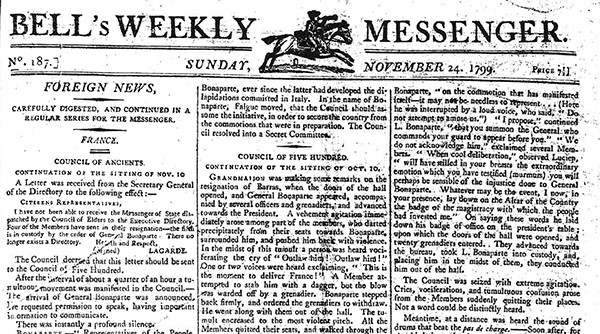see a high definition version of the above image
We can imagine that of all the journals telling the story, the Journal de Paris was the one that was to be most favourable towards Napoleon. It was after all edited by a supporter of the coup, namely Citizen Roederer. The edition published on 19 Brumaire is one of the few to report the pretext for the moving of the organs of government outside Paris to Saint Cloud, in other words the quite far-fetched idea that roving bands of plotters were heading for Paris and merely awaiting a single signal to raise the dagger against representatives of the state. Other papers contented themselves with references to the constitutional justification for the move, without bothering to recount the fable. Most papers seem to report the event through the official documents, for the most part avoiding comment. The Journal des hommes (“written by Patriots”) on 20 Brumaire reproduced a dialogue between a member of the 500 and an “Ancien” destined to calm the public’s nerves: Bonaparte was the man for the job, it gently suggested. Since this also appeared in the Journal de Paris it would appeared to have been composed by the party behind the coup. Further afield, notably in the Batavian republic, the Nouvelles Politiques publiées à Leyde (dated 19 November 1799) wrote that “all good men ardently desire that the new revolution that has just taken place (planned in the greatest secrecy) will effect a change for the better”. It also took a swipe at complainers, remarking that political revolutions are always judged by the results, not their principles, and that those who lost out at 18 Brumaire could hardly object to methods used by themselves at 18 Fructidor! Still further afield, the Courrier de l’Empire published in Munich on 22 November remarked that “Paris is transported with joy and hope, and everyone sees peace as close”. The final paper selected here is the London-printed Bell’s Weekly Messenger, (about 6,000 readers, a large figure for the time) dated 17 November. The editorial begins saying that the news of Brumaire pushed every other French news out of the way. Paris had been the source of “political alteration and vicissitude” since the beginning of the Revolution, and this was no exception. It speaks of Buonaparte’s “restless genius” moulding to his views the will and power of the nation. It criticizes the changes not sanctioned by the voice of the people. But it also does not hold back on it criticism of the Directory and Barras in particular “whose character had been long detested and who had twice betrayed his colleagues in the work of treachery”. It does express perplexity at the reasons for the coup, noting France’s successes “on almost every scene of the Theatre of War, and no internal alteration was necessary to give additional vigour to their military operations”. It ends hoping “that peace which has been the watch-word for some-time past in France […] begins to operate more forcibly, and the necessity of it has induced the necessity of the recent Revolution. That the event may prove conformable to this assumed cause is our earnest desire.”
The digitisation of all these resources means that today we really can “read all about it”.
Peter Hicks (November 2019)


